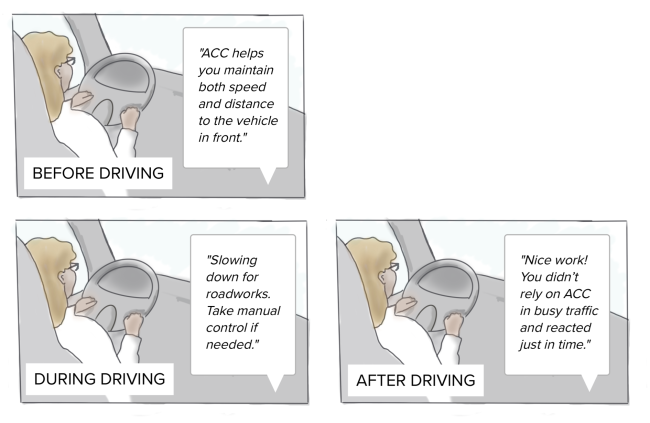ConAI
Full title: ConAI: AI-based conversational agents that support drivers' understanding of ADAS and enhance traffic safety
Summary: Many truck drivers struggle to understand and use Advanced Driver Assistance Systems (ADAS, SAE Level 2), often learning through trial and error, which can lead to misuse or system deactivation. This project explores how AI-based conversational agents can make ADAS more explainable and support learning before, during, and after driving. Through interviews, co-creation workshops, and prototyping, we aim to develop and test concepts with drivers in simulators or real trucks. Led by Scania with RISE as partner, the project supports a PhD and aligns with FFI goals of improving road safety, acceptance, and automation in heavy transport.
Traffic safety benefit: The project enhances traffic safety by improving drivers’ understanding and use of ADAS through AI-based conversational agents, reducing misuse and increasing correct system engagement, leading to safer driving behavior and fewer accidents.
Key words: AI-based conversational agents, ADAS, understanding of ADAS, learning strategy
Ensuring drivers understand Advanced Driver Assistance Systems (ADAS, SAE Level 2) is essential to safe and effective use. Research indicates many drivers currently struggle to grasp ADAS functionalities and limitations, often relying on fragmented learning or trial-and-error methods, leading to misuse, safety risks, or system deactivation.
This project explores how AI-driven conversational agents can make ADAS more explainable and understandable to truck drivers, something that has got limited attention in the truck industry but has been identified as a potential solution in research. The goal is to create engaging, efficient, and accessible learning experiences across different use phases – before, during, and after driving. The research questions are: 1) How do long-haulage truck drivers currently learn to operate ADAS?, 2) How can ADAS in long-haulage trucks be made more explainable and understandable to truck drivers by means of AI-based conversational agents and other interaction modalities?, and 3) What effects do such agents have on truck drivers’ behaviour and psychological aspects, and do these effects vary by gender, age and technological literacy?
Grounded in Design Thinking Methodology, we will conduct interviews and workshops with truck drivers to identify needs and learning strategies they currently use to understand ADAS functionality. Using role-playing, storyboarding, and co-creation workshops, we will develop AI-driven conversational concepts, in combination with other interaction modalities. At least one concept will be prototyped in a simulator or real vehicle and evaluated with at least 20 truck drivers.
By improving learning and comprehension of ADAS, the project will pave way for safer and more frequent use of ADAS by a more diverse driver population. As such the project aligns with FFI’s objectives – enhancing safety, sustainability, equality, and acceptance – and specifically addresses Vision Zero and the safety of road users, thus strengthening Sweden’s competitive edge in safe automation solutions.
Project partners include Scania (project leader and coordinator) and RISE Research Institutes of Sweden (partner), both with multi-disciplinary competences required for successful execution of the project. The project is supporting a PhD thesis at Halmstad University and a master thesis at one of the Swedish universities.

